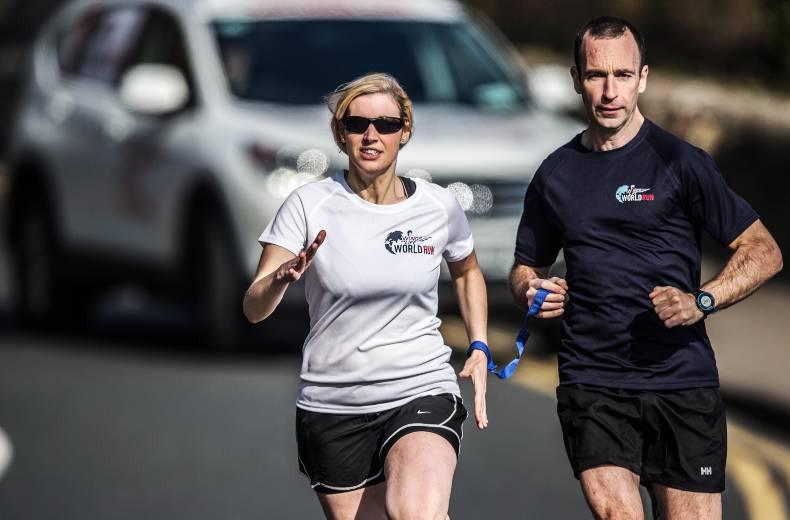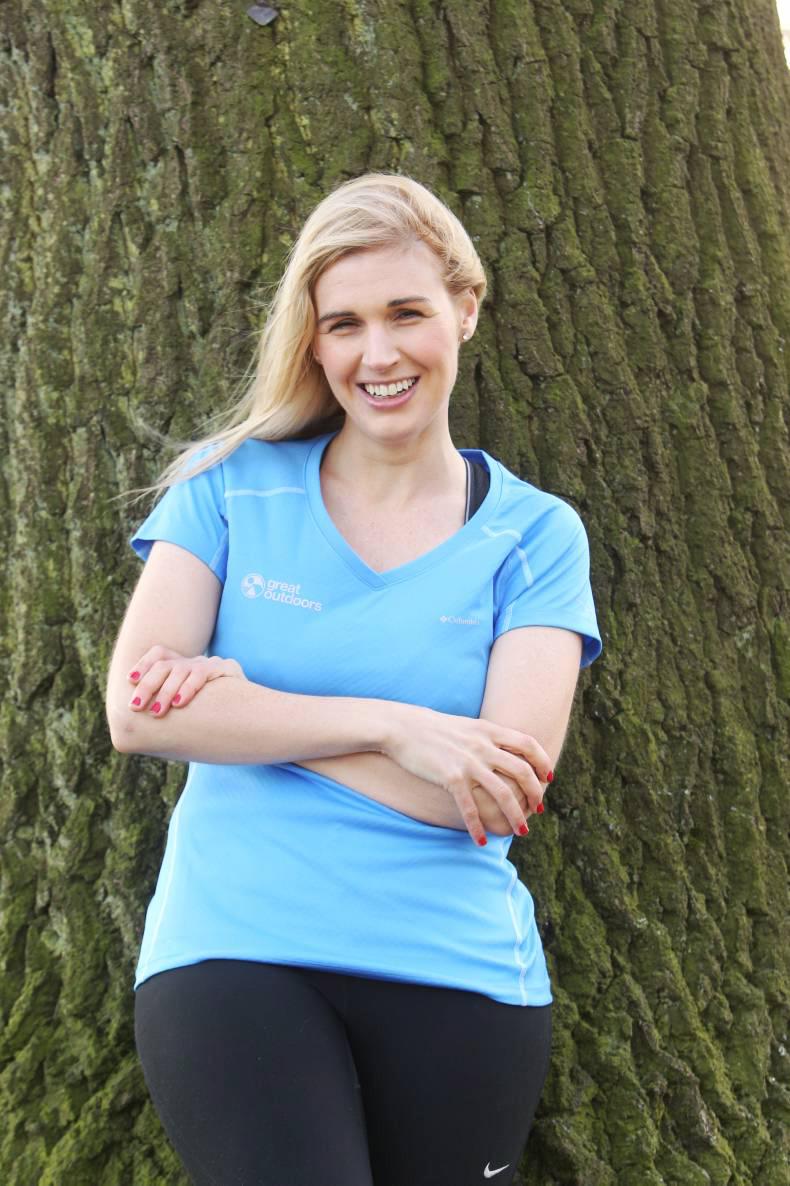With just two miles to go in the Dublin marathon last October, Sinead Kane knew she needed to push it to finish in her goal time of four hours.
So she made the split-second decision to leave go of the tether between herself and the guide runner who was helping her negotiate the course.
“You could see it as a foolish decision or a courageous decision,” she admits. “But my attitude was: ‘If I can’t see the obstacle, it’s not there.’ And then I just ran.”
It’s a story that reveals a lot about the mindset of the 33-year-old from Youghal.
Despite having just 5% vision, Sinead became Ireland’s first registered blind solicitor in 2009, is currently doing her PhD and is making her name on the Irish running scene, even though she only took up the sport at 30.
Put it this way. Some people are blinded by obstacles. Sinead Kane sees – and seizes – opportunities. And keeps raising the bar, higher and higher.
Indeed, when she crossed the line in 4.01 – just one minute past her goal – she was initially disappointed.
“My mother was saying to me before: ‘Sinead, you’re never going to end up getting married because the man that you’re looking for isn’t born yet,’” she jokes of her perfectionist streak.
However, the motivational speaker also reveals that for many years she lacked self-belief that her goals and dreams were ever possible.
Sinead was born with four conditions: congenital aniridia, coloboma, nystagmus and glaucoma. One main issue is that she doesn’t have an iris, so she has no control over the amount of light her eyes let in, making them extremely sensitive and painful.
That’s why she always has a pair of sunglasses to hand, as well as her cane. She can read with a magnifying glass or zoom function on her phone or computer, but little things can prove a challenge – whether it’s matching up socks or checking the best-by date on a loaf of bread.
She was four when her parents told her that she was going to have to make her way through life “looking at things up close” after she got a static shock from pressing her face to the TV.
“There was no sugar-coating on it or no ‘don’t worry, it will get better,’” says Sinead, who explains that her mother Marian lost her sight completely in her 20s, while her father Pat and older sister Aisling are also visually impaired.
Thus, in many ways, growing up with just 5% sight felt completely normal; until Sinead started school and found herself the target of bullies.
“The major impact that it did have on me was the fact that I turned on myself and I became my biggest enemy,” she says, explaining how she felt isolated and “not worthy” right through her teenage years.
“There was a period where I just felt maybe it’s better not to be waking up tomorrow.”
At 17, however, Sinead seemed to find her “fight” when she was advised not to study law because it was a “reading-based subject”.
“I said: ‘I’ll prove you wrong,’” she recalls.
And she did – becoming Ireland’s first qualified blind solicitor in 2009; though it was not an easy path and she struggled to get an apprenticeship. Her drive to succeed, however, was startling. For example, when she secured six months’ experience with the Law Reform Commission in Dublin, she got up every morning at 4am to travel by train from Cork, as she couldn’t afford the rent to stay in the city.
You wonder how she stayed so motivated. For Sinead, however, the question is not how but why?
“I don’t want to be on a blind person’s pension,” she says simply. “That’s my why. And if you don’t know why you’re doing something – if you don’t know why when you’re positive, you certainly won’t know why when you’re negative.”
While Sinead did get a job in a practice in 2013, she decided to leave to pursue a PhD at Dublin City University on a subject close to her heart – a teacher’s legal duty of care inside and outside of school in relation to bullying.
It’s not the only challenge she has dived headfirst into. In 2012, she agreed to do the Flora women’s mini marathon for the charity Childvision, despite never having run before, partnered with another participant to guide her around the course.
“I didn’t even know what a 10k meant,” she admits. “I was always left on the PE bench in school.”
Sinead set two goals for herself: to run the 10k in an hour and to raise €500 for charity.
“And I raised €2,000 for them and I did the 10k in 55 minutes,” she smiles.
Soon, Sinead was smashing her targets left, right and centre – and showing that extraordinary steel again. While training for her first marathon, for example, she travelled from Cork to Dublin on the train every Sunday to run in the Phoenix Park, as she could not get a guide runner locally.
She has since teamed up with ultra runner John O’Regan, who was previously a guide for Mark Pollock.
Together, they have completed a 50k ultra run and in May they took part in the Wings For Life race in Brazil on the invitation of Red Bull. More importantly, they also helped to change policy for the Flora women’s mini-marathon after making headlines when Sinead was initially refused permission to have a male guide runner, and on the June bank holiday Monday Sinead won the visually impaired category of the race.
“If you had asked me last year did I have any ambition to run a marathon? No. Did I ever think I’d be running in Brazil? No,” says Sinead.
“So things happen in life, opportunities come your way and you just have to say yes to the opportunities, even if there is a fear factor there.”
For Sinead, running is a way to test the limits of her body and, more importantly, her mind. She doesn’t want to be put on a pedestal but she does want to inspire people to realise their own potential.
Little wonder then that she has given motivational talks to companies including Pfizer and EMC, she is a director of Ablevision Ireland, a media training organisation for adults with intellectual disabilities, and one day she hopes to set up her own foundation for visually impaired children.
She also sees herself rising to a senior leadership position in the future. “Every day,” she says, “I visualise that.”
This concept of visualisation is something Sinead is passionate about.
“We can see with the eyes, but it’s the mind that has the vision,” she explains, “and I suppose I believe that’s why I am achieving things that my able-bodied friends aren’t achieving, because I rely on my mind an awful lot.”
“Self-acceptance” is also something she sees as key to her success – simply because “it’s exhausting trying to be somebody else”.
“I can blame my parents for having the disability. I can blame those who bullied me. I can blame everybody else,” she says. “But, ultimately, my own happiness lies with me.”
And sometimes it comes down to whether or not you are willing to take a step into the unknown and walk where you can’t see.
Or, in Sinead Kane’s case, run.
Visit www.sineadkane.ie or follow
@KaneSinead on Twitter






 This is a subscriber-only article
This is a subscriber-only article













SHARING OPTIONS: